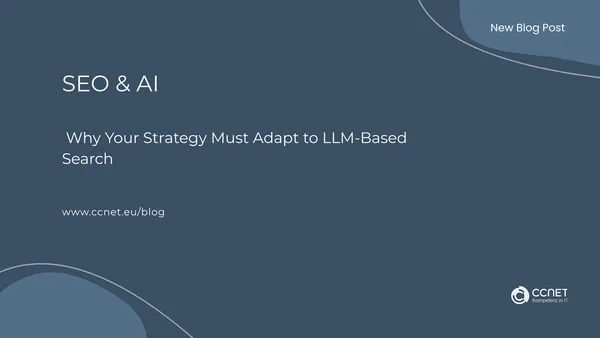
CCNet
May 29, 2025 • 1 min read

SEO is not intuition, but a process. Many projects fail due to lack of control, transparency, and standards.
SEO and AI: Why Your Strategy Must Adapt to LLM-Based Search Systems
Traditional Google search is no longer the only gateway to online visibility. More and more users are turning to AI-powered systems like ChatGPT, Perplexity, or Google AI Overviews for fast, precise answers. But what does this shift mean for your content? And how does the role of SEO change when the goal is no longer the click — but the answer itself?
AI Is Changing Search Behavior – and SEO Must Follow
Today’s content creators must understand: Large Language Models (LLMs) evaluate content differently than classic search engines. They analyze context, detect semantic depth, and favor content that is structured, trustworthy, and immediately clear. Traditional keyword-based SEO is no longer enough — what’s needed is a dialog-friendly structure and content that works even without external context.
Rethinking Visibility: From Rankings to Citations
In an AI-driven world, visibility doesn’t necessarily mean being ranked #1 on Google. What counts is whether your content is cited, linked, or paraphrased in AI-generated answers. Being mentioned in AI Overviews or chat responses builds trust — even without conventional website traffic. This demands a new approach: content must be prepared in a way that machines can understand and use effectively.
SEO Becomes More Strategic – Not More Technical
It’s no longer just about metadata or structured data — it’s about a holistic understanding of relevance and context. Companies that want to remain discoverable must rethink their SEO strategies: focusing on questions rather than keywords, on connections rather than content clutter, and on knowledge authority rather than word count. Trust, clarity, and a strategically designed content landscape are the new path to visibility.
Conclusion: AI Tools Are Transforming Search – Your SEO Strategy Must Evolve
LLM-powered systems aren’t the future — they’re already here. Those who adapt will not only gain visibility but also earn lasting trust and professional relevance. It’s time to rethink SEO — not just for algorithms, but for the digital conversations of tomorrow.